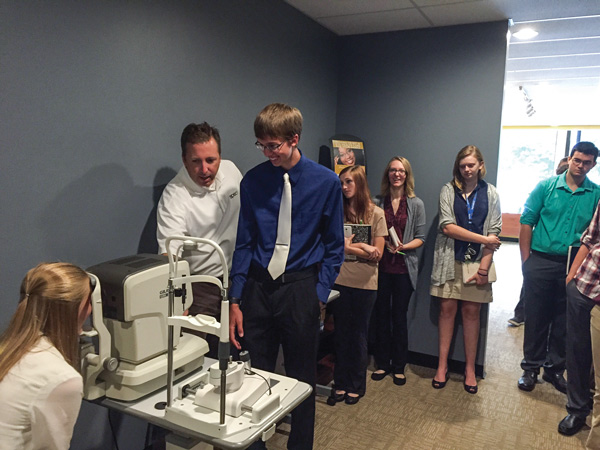The statistics are daunting. Once considered a land of opportunity, Illinois is losing population at a record rate. People are leaving in search of jobs, lower taxes and a better quality of life. According to the Illinois Census Bureau, from July 2016 to July 2017, 83 of 102 Illinois counties lost population, primarily in the rural areas served by the state’s electric and telephone cooperatives.
Population loss affects nearly every aspect of life, and the American dream of achieving a better quality of life through hard work is fading. Job prospects are diminishing, as is hope. No one sees this reality more than young people – our future business leaders. But what is their incentive to stay in the state?
“Up until the Industrial Revolution, kids from down the street could be apprentices,” says Sand Roads Consulting CEO Bruce Giffin, who manages Illinois Electric Cooperative in Winchester. “Kids learned the trade there. They were nurtured in the community and were kept in the community. Now we just export them. If we don’t nurture and grow our own, we’re just going to continue to have all of this population decline.”
With the purpose of helping the younger generation find more value and potential in their home communities, Illinois Electric and many other electric and telephone cooperatives are now participating in the Creating Entrepreneurial Opportunities (CEO) program through Midland Institute for Entrepreneurship in Effingham. Of the communities that offer the program, 98 percent fall within the U.S. Census Bureau definition of rural areas.

While traditional education provides the tools for students to use in a future career, CEO’s unique business model integrates entrepreneurial education into the traditional high school curriculum and teaches practical application of those tools. For 90 minutes each school day, a trained program facilitator helps students ascertain how to become an entrepreneur. A significant portion of the class includes meeting with area business leaders to learn how their businesses operate and the skills necessary to be an owner or a manager.
Each student is matched with a mentor from the business community who helps them develop a business plan to start their own company. This atmosphere provides these young people the opportunity to experience starting a business without the risks normally associated with such a venture. Illinois Electric Cooperative employees act as the facilitators for three programs in west central Illinois. Classes are only held at businesses or community organizations. Other electric and telephone co-ops also provide this level of leadership or space for classes, funding and/or serve on the board of their local CEO program.
According to Giffin, the CEO program teaches skills students are not learning anywhere else. In his opinion, one of the most important is social capital, or as he puts it, “a really diverse and productive network.” By having access to so many businesses and business leaders, students can find help for nearly any issue that arises with their own businesses and this provides indelible ties to the community. “So, a kid who finishes the CEO program knows everybody who knows anything in the community. If they don’t have the answer, they know someone who does,” explains Giffin.
CEO alum Trevor Sandidge, a native of Warsaw who participated in the Hancock County CEO program, agrees. “More than anything, I think the network that provides access to the amount of people I know back in my hometown today, who I didn’t know before, is unreal. Anything I need, I know that I can call and get in touch and they’ll help me out in that aspect, and likewise from me to them.”
Another area addressed through the program is social skills. So much of today’s communication, especially among young people, is on a screen rather than face-to-face and doesn’t foster a true social connection. “It might sound crazy, but it’s unreal just how many young people can’t hold a conversation with an adult,” says Sandidge. Giffin and Gina Hamilton, owner of Hamilton’s Catering in Jacksonville, team up for every class addressing every aspect of social etiquette – conversational skills, how to greet people, when and where to sit, and proper table manners.
CEO is underwritten in part by Midland Bank in Effingham, but considerable funding comes from local businesses. Rather than depending on large donations from a few donors, each CEO class relies on $1,000 donations from 30-50 community leaders. These funds underwrite costs to run the program and ensures that a substantial number of businesses have a vested interest in its success. The businesses also participate as presenters and offer business tours as part of the CEO curriculum.
To apply for the CEO program, students must write an essay expressing their interest in the program and include recommendations from a teacher or guidance counselor and an employer or someone they know from the community. They must undergo a rigorous selection process as competition for program seats is fierce. Grades are not a consideration for acceptance to the program but being trustworthy and having good work ethic is a requirement. Giffin says he has one spot for every two applicants, and siblings of former CEO participants are now vying for class slots. Given the experience gained, one would think the cost to participate would be high, but there is no cost to students.
There are potential financial rewards for CEO students. At the end of each class, $5,000 in college scholarship money is divided based on the success of each student’s business.
The CEONext National Trade Show, through the Midland Institute for Entrepreneurship, is held annually for students to showcase their businesses. Students participate in the trade show on an invitation-only basis, and three exhibitors are awarded $2,500 to invest in their businesses.
Illinois colleges are recognizing the value of the CEO program. For instance, Illinois College in Jacksonville, John Wood Community College in Quincy, Lewis and Clark College in Godfrey and Lincoln Land Community College in Springfield give college credits for students who have successfully completed the CEO program. Sandidge says that because of this, he was able to save the cost of a year of tuition.
Among others, Illinois College and Millikin University in Decatur offer entrepreneurship programs. Trevor May, enrollment management, network strategist, adjunct faculty in Tabor School of Business at Millikin, says, “Millikin sees the CEO program as the first entrepreneurship program in the high schools currently producing some top-notch students who are thinking outside the box and pushing the envelope when it comes to entrepreneurial thinking.”
Millikin offered $10,000 scholarships for the first time in 2018 to students who exhibited in the CEONext trade show, and 14 scholarships were awarded. May explains, “We want to see students who are in this environment of entrepreneurialism and creativity come to a place that has the same feel and the same opportunities to really grow their entrepreneurial spirit. It’s kind of like the CEO program but with more autonomy, more traction and more resources.” He adds, “When the university started looking at all these high performing students who came out of the CEO program, we knew we needed to get them to Millikin. They’re the kind of students who need to be here.” Millikin’s next step will be offering college credit for students who complete the CEO program.
How successful is CEO? Although it is still in its infancy, the fruits of its labor are evident. As he works toward a degree in business management and management information systems at Creighton University in Omaha, Neb., Sandidge continues to operate Legacy Conversions, the business he started through the CEO program. The company specializes in converting VHS tapes to DVDs, slides to digital photos and Super 8 film to DVDs.
Some other businesses that can attribute their start to the CEO program include Mette’s Distinctive Lighting in Effingham, an upscale lighting company; and DKJ Designs and Show Clothing in Moweaqua, which creates upscale jackets for showing horses.
Because Sandidge and other CEO alums have already experienced writing business plans, running a business, and have support from the contacts they’ve made through the program, they have more confidence as they look to the future. Since local business leaders work directly with the students, they can see their potential and work ethic first-hand. It’s not unusual for a local business owner to tell a participant that when he/she finishes college, to return to the community and work for him/her. Sandidge has already received three job offers.
Since its inception, CEO has grown to 45 communities in Illinois, Indiana, Minnesota and Colorado with the goal of having a national presence. The formula works – people are investing in the community, growing it and creating opportunity for generations to come. But, it’s not just about growing a community; it’s about growing hope.
For more information about the CEO program, visit midlandinstitute.com.
Featured Image: Zach Mette proudly poses at Mette’s Distinctive Lighting in Effingham, the business he started through the 2015 Effingham CEO program.







